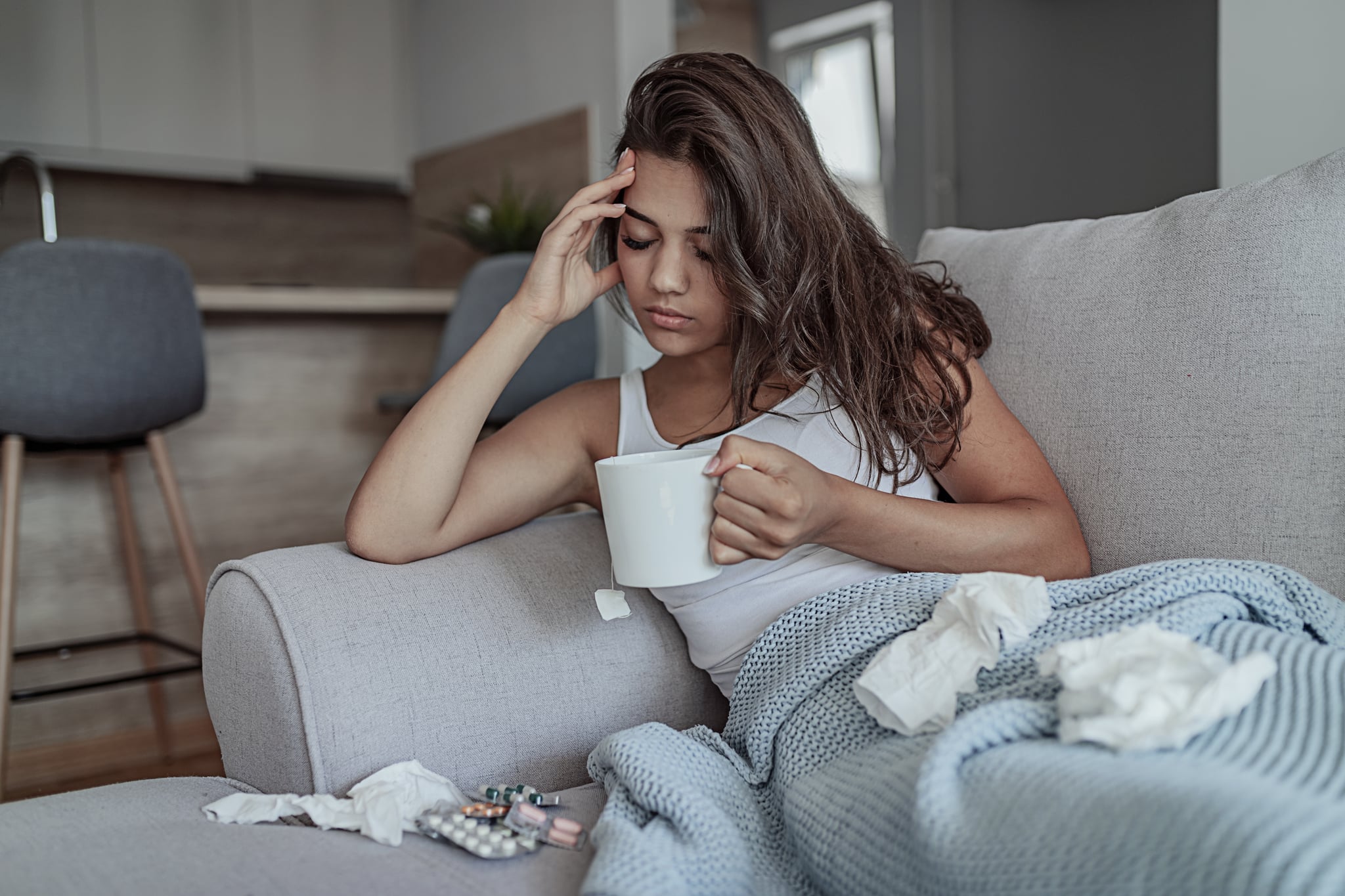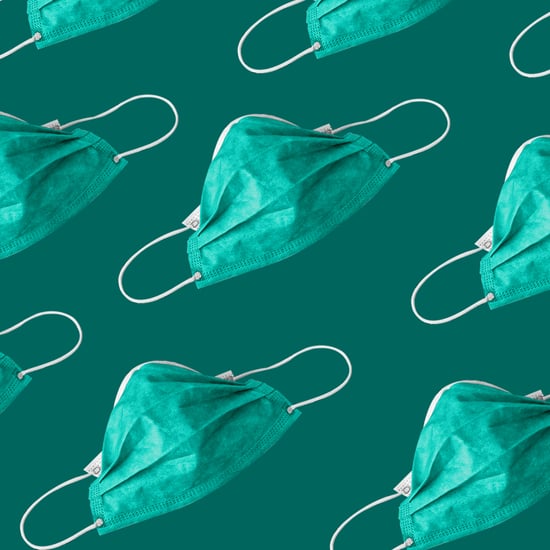Coronavirus Recovery: Doctors Share Their Top Advice
Recovering From the Coronavirus at Home? 2 Doctors Share Their Advice on How to Feel Better

In the UK currently, tens of thousands of people a day are testing positive for COVID-19, leaving a lot of people at home experiencing symptoms. Since coronavirus is a new virus, information on recovery hasn't always been readily available — especially at the start of the pandemic — but thanks to scientific research being done, much more information is now being released and advice from doctors is widely available.
It's important to note that not only do coronavirus symptoms vary drastically from person to person, but the severity of those symptoms vary drastically as well — one of the reasons COVID-19 is such an easily transmissible virus. In most cases, recovery from coronavirus can be done without a trip to the hospital, and with hospital admissions rising across the UK, it's important that as many of us try and recover from home as much as possible. Whilst there are no specific treatments for coronavirus, according to a few GPs we've spoken to, there are things you can do to help ease your symptoms and aid recovery at home.
Over the past few weeks, a Twitter thread has gone virus that details how to recover from COVID-19 at home, and that shares recovery tips that are simple, helpful, and even a bit strange-sounding. But rule number one when it comes to the internet: don't trust everything on the internet. That's why we asked two UK NHS doctors for their opinion on the tips detailed in the thread. Here, they give advice on recovering from coronavirus at home, including the red flags you should be aware of in case a trip to hospital is necessary.
Maintaining Movement Whilst Recovering From COVID-19 at Home
One of the top tips online for coronavirus recovery is maintaining movement, even if you're tired. "The idea that you walk every two hours is really important," said Dr Sonal Shah, an NHS GP in Tower Hamlets. "It's really important that every half an hour or at least every hour, you sit up and take some really deep breaths. By doing this, you're allowing air to ventilate all the way through the lungs. By moving your position, you're allowing air to go from the top of your lungs all the way down to the bottom. And by sitting upright and taking really deep breaths, you're really encouraging the flow of air," she explained.
Dr Jeeves Wijesuriya at the Healthcare Workers' Foundation echoed this: "Start slowly and build up your level of activity over time, try to do little and often and rest between activities so you don't overdo it." He advised to reduce your time sitting by moving every hour and even setting yourself small goals in the day, such as making a cup of tea. "My clinical advice would be, every half hour to an hour, stand up, hold onto a side of a chair, do some deep breathing, around three to four breaths," Dr Shah added.
The reason movement is so important during initial recovery from the virus is because if you don't move, "you will start getting collections at the bottom of your lungs, which could lead to further infection," said Dr Shah. "Coronavirus is a viral infection so you can then get a secondary bacterial infection on top. You want to encourage your lungs to almost clean themselves out because every time you breathe out, you're exhaling bad air as it were; you're getting rid of all those toxins. You're exhaling carbon dioxide so it helps with the aeration of your lungs," she explained.
Once you're clear from the infection, Dr Wijesuriya noted that daily exercise is important, even if you have to stop and rest during the walk. "You may notice your tiredness increase and some breathlessness at first but these should improve; this is a normal response to doing more exercise. Regular activity will help to minimise pain and stiffness and will help you regain muscle strength over time," he added.
If you're struggling to stay mobile by walking around, the Guy's and St Thomas' Hospital outlines some key positions to ease breathlessness.
Is Sleeping on Your Stomach Is Better Than Sleeping on Your Back Whilst Recovering From COVID-19 at Home?
Next, the viral thread advised that sleeping on your stomach during recovery is better than sleeping on your back. In short, Dr Shah explained that, "yes, that is good advice because it's easiest for your lungs to work when you're on your front to open up your airways." Dr Wijesuriya noted that although it depends on the setting and context, "most people breathe much better when they're not on their back."
Dr Wijesuriya explained that in intensive care, doctors and nurses use a technique called proning, where they put patients flat on their front with their face down. "This is done for critically unwell patients as an effective treatment for abnormal secretions pooling in lung tissue with a condition called acute respiratory distress syndrome." He advised that if you're recovering at home and have a cough, it's best to avoid laying on your back to reduce pressure or weight on your chest and instead recommends sleeping on your side instead.
What Temperature of Water Is Best to Drink When Recovering From COVID-19?
Both Dr Shah and Dr Wijesuriya stated that the most important thing is that you drink. Staying well-hydrated by drinking plenty of fluids in whichever way you prefer is their advice; choosing a drink that you prefer means you're likely to drink more of it. "If you've got a sore throat, actually something cold may be very, very soothing. Whereas if you have a slightly tickling throat, having something like warm honey and lemon, might be much more desirable," said Dr Shah. "Equally, when you are dehydrated, or you are vomiting, it may be more beneficial to have something that has isotonic fluid; so having something that's got salt and sugar in it." This could be a dioralyte or ribena (hot or cold). "In short: it doesn't really matter [what temperature a drink is], but hydration is key," Dr Shah said.
What Over-the-Counter Medication or Vitamins Can Someone Recovering From COVID-19 At Home Take?
"Many people experience loss of appetite and reduced food intake when unwell with COVID-19 and during their recovery. It is normal to feel tired after being unwell, and recovery can take time. You might have some new symptoms associated with COVID-19 such as smell and taste changes, shortness of breath, a dry mouth, or nausea," said Dr Wijesuriya. "This can make it difficult to get the right nutrition you need to help you do your day-to-day activities."
Dr Wijesuriya explained that you should try and eat little and often. If you can, he recommended having three small meals a day plus snacks and drinks in between. "Choose protein-rich (meat, fish, eggs, cheese, beans, or lentils) and energy-rich foods." He emphasised the need to keep well hydrated by drinking plenty of fluids, noting that "milk-based drinks can also provide additional nutrients like protein." If you aren't able to eat much, you might want to take a multivitamin or mineral supplement, or in some cases, when it has been approved by a medical professional, an oral nutritional supplement drink, which will contain the vitamins and minerals you need, Dr Wijesuriya explained.
He also advised that if you don't spend enough time outside regularly, or have a darker skin tone, your body might not be making enough vitamin D. In this case, a vitamin D supplement can be beneficial as it helps maintain healthy teeth and bones, as well as keeping your immune system strong. It can also help boost your energy levels and enhance your mood, too. This is something that Dr Shah also recommended. Vitamin D supplements can be purchased at most supermarkets and pharmacies; but remember, if you have coronavirus, get someone to do your shopping for you.
Dr Shah also recommended taking regular paracetamol and/or ibuprofen if you're suffering from symptoms like aches and pains, as well as taking decongestants and cough syrups if you feel like you need it. "My advice for all people is, you should make sure that your medicines cabinet at home is always fully stocked because when you're unwell, the last thing that you want to do is pop out to the shops. So a medicine cabinet should always contain paracetamol, ibuprofen, Dioralyte, cough and cold medicine, and some sort of decongestant," Dr Shah said, adding that cheaper, supermarket own-brand medicines work well and are much more affordable.
Keeping Stress Levels Low Can Help Aid Recover
Coronavirus and anxiety can go hand-in-hand, especially if you already have an anxiety disorder. "[The virus] is miserable and it will take time to recover," said Dr Shah. "If you find yourself getting upset, your mood is down, or you're getting quite anxious because you're struggling to take a deep breath, or simply because it is a really anxiety-inducing time, [the NHS] has got lots and lots of information to help." For this reason, she noted that learning good breathing techniques and managing anxiety are both really, really important, particularly if you're recovering from coronavirus and it's taking a little longer. Guy's and St Thomas' Hospital has some really great tools on breathing techniques.
What Red Flags Should Someone Recovering From COVID-19 At Home Look Out For?
Whilst in many cases, recovery from coronavirus can be done at home and doesn't require a trip to hospital, there are red flags that you should be aware of that signal when you or your loved one should seek further medical assistance.
These red flags include, chest pain and difficult breathing that isn't going away. "Count from one to 20, and if you can't do that without taking a deep breath, or out of the blue you suddenly become very, very breathless, you must call 111 or your GP." If your temperature is not settling, despite taking paracetamol and ibuprofen.
Another sign that you might need further medical assistance is if you're light headed and weak, having new, unexplained severe muscle cramps, and if you or your loved one is confused, disorientated, and drifting in and out of consciousness. Both doctors also agreed that if you've not passed urine in 12 or 24 hours, "that's a very worrying sign and might mean that you're clinically dehydrated," said Dr Shah. All of these symptoms are signs that you need to seek further medical help by calling 111.
For more information, visit the Your COVID Recovery guide on the NHS website and the Guy's and St Thomas' resource website. The Healthcare Workers' Foundation is currently raising money for the Family Fund to help families who have lost a loved one on the frontline due to COVID-19.
POPSUGAR aims to give you the most accurate and up-to-date information about the coronavirus, but details and recommendations about this pandemic may have changed since publication. For the latest information on COVID-19, please check out resources from the WHO, the NHS, and GOV.UK.

